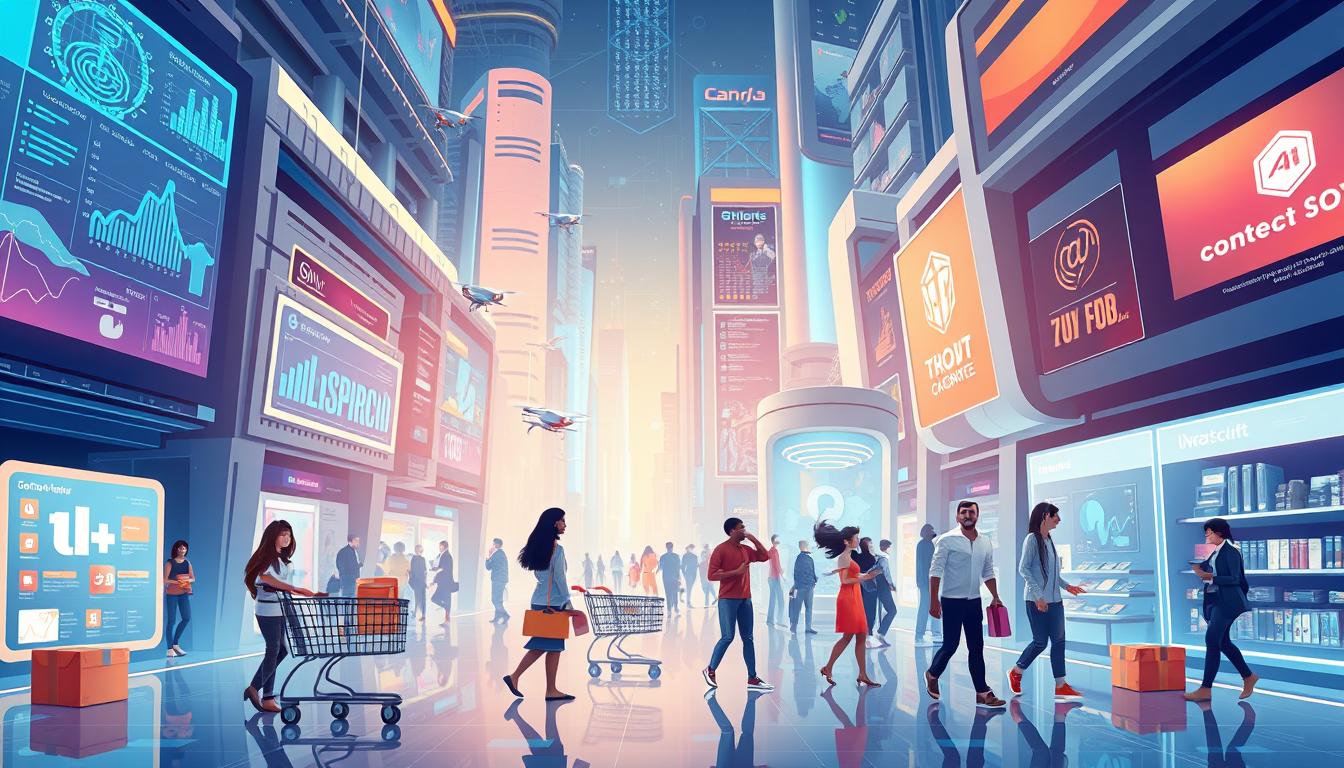AI-Powered Strategies for Boosting Your E-commerce Sales
In today’s fast-paced e-commerce world, staying ahead is key. Shoppers want unique experiences, and businesses are looking for new ways to grab their attention and boost sales. Generative AI is a game-changer, set to change how online stores connect with and turn customers into buyers.
So, how can e-commerce businesses use generative AI to stay ahead? This article will explore how generative AI can help. We’ll see how it can make shopping more personal, improve customer interaction, and increase sales.
Key Takeaways:
- Generative AI can help e-commerce companies analyze customer behavior, preferences, and purchase history to boost direct-to-consumer sales.
- Personalized product recommendations based on customer data can enhance the shopping experience and increase sales.
- AI-powered marketing campaigns can lead to targeted strategies that resonate with individual consumers, driving direct sales.
- Generative AI tools can conduct complex data analysis to identify enticing product deals and create hyper-personalized experiences.
- AI-driven virtual shopping assistants can offer tailored recommendations to improve the user experience and streamline the sales funnel.
Understanding Generative AI for E-commerce
Generative AI uses advanced machine learning to create new, unique data. It’s used in many areas, like music and film, and is now changing e-commerce.
What is Generative AI?
Generative AI makes original content like images, text, or videos by learning from data. It’s trained on big datasets to spot patterns. This lets it make new things that look like the original data. This is great for e-commerce businesses wanting to make their customers happy.
Key Benefits of Generative AI for E-commerce
Generative AI for E-commerce brings big wins for smart retailers:
- Happy customers and loyalty with AI-Powered Personalization in product suggestions and ads
- Bigger orders and more repeat buys by using Machine Learning Algorithms to guess what customers want
- Better analytics and campaign tweaks, making AI-driven marketing strategies more effective
- More customer interaction and fewer returns with AI-powered visual product customization tools
As generative AI is set to hit USD 110.8 billion by 2030, e-commerce companies that jump on this tech will see more Increased Ecommerce Revenue and a unique edge.
“By 2025, generative AI is predicted to be responsible for 10% of all data generation, a stark increase from under 1% in 2021.”
Personalized Product Recommendations
In the world of e-commerce, making product recommendations that fit each customer is crucial. By using customer data and AI, businesses can offer products that match what customers like. This approach boosts engagement and sales.
Leveraging Customer Data for Tailored Suggestions
Generative AI is great at looking at customer data. It checks browsing history, purchase patterns, and what customers like. This helps it give spot-on product suggestions. In fact, using AI for these recommendations can boost sales by up to 915%.
Examples of Personalized Recommendations
Think about a clothing store using AI to make shopping better. It looks at what customers buy and like to suggest outfits and accessories. This makes customers more likely to buy and feel happy with their choices. Industry data shows 56% of online shoppers come back if a site recommends products to them.
| Statistic | Value |
|---|---|
| Customers who expect personalized experiences | 71% |
| Increase in customer engagement with Generative AI | 6-10% |
| Customers who get frustrated by non-personalized experiences | 76% |
Using Personalized Product Recommendations and Ecommerce Personalization helps businesses. They can make shopping more engaging and relevant. This leads to more sales and loyal customers.
AI-Powered Chatbots and Virtual Assistants
In the fast-paced world of e-commerce, smart businesses use AI-powered chatbots and virtual assistants. These tools help make customer service better and improve shopping experiences. They talk to customers in a way that feels natural, giving quick and right help for many questions and issues.
Using AI-powered tools, e-commerce companies can cut down on wait times and costs. They also make customers happier. For example, 1-800-Flowers got 70% more new customers with their Facebook chatbot. HelloFresh saw their response times drop from 5 hours to just 1 hour and 11 minutes with the Freddy Bot.
These AI-powered tools do more than just answer questions. They can guess what customers need and offer help before they ask. By using customer data and advanced analytics, chatbots and virtual assistants help with selling more products. This can lead to more sales for e-commerce sites.
Adding AI-powered chatbots and virtual assistants to online stores is changing how businesses talk to customers. These conversational AI tools automate simple tasks, make support smoother, and give customers personalized experiences. This is making e-commerce more efficient, quick, and focused on the customer.
| Benefits of AI-Powered Chatbots and Virtual Assistants | Examples |
|---|---|
|
|
By using these AI-powered solutions, e-commerce businesses can make customers happier, run smoother, and increase sales and loyalty.
AI-Driven Sentiment Analysis and Customer Feedback
In today’s e-commerce world, knowing what customers think is key to winning. AI helps businesses understand how people feel about their brands and products better than ever. By looking into what customers say and feel, companies can fix problems fast, make smart choices, and improve how they connect with customers.
Monitoring Brand Sentiment and Product Reviews
AI tools can check out lots of customer feedback, like online reviews and social media posts. This helps businesses keep up with what customers want and like. For example, a restaurant can use AI to quickly fix issues in online reviews and make customers happier.
Proactive Issue Resolution and Strategy Adjustment
AI helps e-commerce companies understand what customers think and what they don’t like. With this info, they can fix problems early, make their products better, and talk to customers in a way that meets their needs. This quick response helps companies stay ahead, improve customer satisfaction, and grow sales.
AI has changed how businesses handle customer feedback. It can look at a lot of data and understand feelings. This gives e-commerce companies a full picture of how people see their brands and products. By using this info, companies can quickly solve problems, shape their plans, and build stronger bonds with customers.
Predictive Analytics for E-commerce
AI and generative AI are changing e-commerce by making predictive analytics more powerful. This tool helps businesses guess what customers will want and like. It’s making the industry better by letting companies know what customers will do next.
Forecasting Customer Behavior and Demand
Predictive analytics uses machine learning to look at big data. It finds patterns and connections that are hard for people to see. By looking at many things, like what customers bought before and who they are, AI models can predict what customers will buy, who might leave, and changes in the market.
Data-Driven Inventory and Pricing Decisions
With these predictions, e-commerce companies can make smarter choices about what to stock and how much to charge. Predictive analytics keeps the right amount of stock, avoiding too little or too much. It also helps with marketing, finding the best campaigns and who to target.
Using predictive analytics, e-commerce companies can get better at what they do. They can make customers happier and sell more. As AI in e-commerce grows, getting these tools will be key for businesses wanting to lead.
“Predictive analytics is reshaping the e-commerce landscape, providing businesses with tools to anticipate customer behavior and preferences.”
AI-Powered Strategies for Boosting Your E-commerce Sales
E-commerce companies looking to boost their sales should use artificial intelligence (AI). AI helps with personalization, automated marketing, and virtual shopping assistants. These tools make the customer experience better and increase sales.
AI-powered personalized recommendation engines look at what customers like and suggest products they might want. For example, OptiMonk AI’s Smart Personalizer can make landing pages more personal, raising conversions by up to 30%. Octane AI also offers quizzes and product suggestions to help e-commerce businesses understand their customers and sell more.
AI also helps with automated marketing campaigns. Tools like Synthesia and Landbot use AI to make videos and chatbots that talk to customers. This makes marketing easier and gets customers more involved.
Companies can use AI-powered virtual shopping assistants to help customers during their shopping journey. Lavender is an AI tool that helps improve sales emails. SearchIQ uses AI to make searching on websites better and give customers personalized product tips.
By using these AI strategies, e-commerce businesses can make shopping more personal, engaging, and efficient. This leads to more sales and loyal customers.
“Online retailers using Generative AI tools have seen a 30% increase in sales.”
Customer Segmentation and Targeted Marketing
Effective customer segmentation and targeted marketing are key for making experiences personal and boosting marketing ROI. Generative AI tools look at lots of customer data to make detailed profiles and segments. This helps businesses make tailored campaigns and promotions that get people involved and increase sales.
Creating Detailed Customer Profiles
AI-driven customer segmentation is super precise. Tools like Predictive GenAI give a detailed look at buyers. This means a clear picture of who they are for better targeting. It also changes with the market, unlike old ways that don’t keep up.
Tailored Campaigns and Promotions
Using AI for customer segmentation and targeted marketing helps ecommerce businesses give customers what they want. For example, an online electronics store can make special Shopify ecommerce templates for email promotions. This makes people more likely to click and buy.
“AI-powered customer segmentation enables businesses to tailor marketing efforts to individual customer preferences and behaviors, driving increased engagement and sales.”
Top Generative AI Tools for E-commerce
Ecommerce businesses can use advanced generative AI tools to improve their work, increase sales, and give customers amazing experiences. These tools use artificial intelligence to automate tasks, make content more personal, and get more people involved and making more money.
Solidgrids for Professional Product Imagery
Solidgrids turns simple phone shots into professional product images fast. With AI-Powered Product Imagery, online stores can make product pictures that grab potential customers’ attention and help sell more.
Maverick for Personalized Video Generation
Maverick lets online stores send Personalized Video Generation to their customers. These AI-made videos are great for saying thanks after a purchase, welcoming new customers, helping with customer service, and more. They make customers feel valued and help build a stronger connection with the brand.
Other Notable AI Tools for E-commerce
- Kili: An AI personalization tool that creates virtual shopping assistants, driving higher conversions.
- Copysmith.ai: Generates SEO-focused product descriptions to improve search rankings and drive more traffic.
- Adcreative.ai: Creates ads and social media content that focuses on getting people to buy, boosting engagement and sales.
By using these and other Generative AI Tools for Ecommerce, online stores can make things run smoother, improve how customers feel, and increase sales and revenue. With the chance to make up to 40% more money (McKinsey, 2021), investing in these AI tools could really change the game for online success.
Dynamic Pricing and Personalized Advertising
In the world of online shopping, being quick to adapt is key to winning. Thanks to Dynamic Pricing and Personalized Advertising powered by Generative AI, online stores can gain a big advantage.
Leveraging AI for Demand-Based Pricing
Customers always look for the best deals online and in stores. Dynamic Pricing strategies, backed by AI, help stores adjust prices smartly. They use data like how customers act, what’s in stock, and what others charge to set prices. For instance, during winter, stores might charge more for coats and winter gear because they’re in high demand. Then, they can lower prices as demand goes down.
Generating Targeted Ad Content with AI
Generative AI also changes how online stores use Personalized Advertising. It uses the data stores already have to make ads that speak directly to customers. This means ads that really catch on, leading to more people buying and sticking around. It makes shopping online more fun and personal, which can lead to more sales and loyal customers.
A study found that using AI for dynamic pricing could boost profits by up to 22%. Also, using AI to adjust prices can cut down on extra stock by 30%. By using Generative AI, online stores can stay ahead, offer unique experiences, and set the best prices for success.
Measuring the Impact of AI on E-commerce Sales
To get the most out of AI in ecommerce, it’s key to track its impact and keep improving. KPIs for Ecommerce AI like customer acquisition cost and conversion rates are important. They help businesses see how well their AI-driven efforts are doing. By looking at these numbers, they can make smarter choices to Optimizing Ecommerce AI Strategies.
Keeping an eye on AI-powered strategies is crucial to stay ahead. McKinsey says that generative AI can make customer experiences much better by offering content just for them. AI also helps with pricing by adjusting it quickly based on demand and stock, which can boost sales and profits.
AI can also suggest products that fit what customers like, making them more likely to buy. Using AI in SEO can lead to better rankings and more traffic, which means more sales. This is because AI can handle lots of data fast and spot patterns.
By always checking on important numbers and adjusting based on data, ecommerce businesses can keep improving their AI use. This leads to ongoing growth and success in the fast-changing online market.
Conclusion
Generative AI technologies are changing the game for ecommerce. They help businesses make the customer experience better, make things run smoother, and boost sales a lot. With tools like personalized product suggestions and AI chatbots, ecommerce companies have a strong way to stay ahead and meet customer needs.
By using these new technologies, ecommerce businesses can grow and succeed in the fast-changing online market. Studies show that AI can increase sales by 3-15% and make customers more engaged by up to 20%. AI helps personalize shopping, make things run better, and make smart decisions based on data. It’s now key for ecommerce companies to do well.
The ecommerce world is always changing, and using AI will be more important for businesses to stay ahead. By using the tips and strategies from this article, ecommerce leaders can set their brands up for success. They can use AI to boost their sales and make the most of this new technology.
Source Links
- Council Post: 12 Ways E-Commerce Companies Can Boost D2C Sales With AI
- How Ecommerce AI is Transforming Business in 2024
- AI for E-commerce and Customer Experience
- Welcome to the World of Generative AI in E-Commerce – GrowthNatives
- Generative AI in E-commerce: Use Cases, solutions and implementation
- AI-Powered Personalized Product Recommendation in eCommerce
- How AI-powered product recommendations increase conversion – Algolia Blog
- AI-Powered Chatbots: Transforming Digital Commerce
- AI-powered Chatbots for Ecommerce | Aunoa
- AI in eCommerce – 5 Top Tips To Boost eCommerce Sales With AI & Automation
- The Impact of AI Sentiment Analysis: Benefits and Use Cases
- How to achieve business success with AI-driven customer sentiment analysis
- AI-Powered Predictive Analytics: The New Ecommerce Ally
- Driving E-Commerce Forward with AI Innovation
- Predictive Analytics in eCommerce: A Complete Guide 2024
- 10 Powerful AI Tools for Ecommerce to Drive Sales in 2024
- AI Shopping Assistant: Complete Guide to Boost eCommerce Sales
- 10 ways AI is transforming ecommerce
- Revamp Your Marketing Campaigns With AI Customer Segmentation
- AI Customer Segmentation Strategies | Mailchimp
- Top 13 Generative AI Tools for Boosting Ecommerce Sales and Enhancing Customer Experience
- 8 AI Tools for Ecommerce [2024]
- AI-Powered Dynamic Pricing Strategies for eCommerce
- AI-Powered Dynamic Pricing: Boost eCommerce Revenue in Real-time
- The Impact of AI on E-commerce Conversion Rates: Enhancing Online Sales Efficacy | ProfileTree
- AI-Powered Ecommerce SEO Strategies to Boost Sales
- Boost Your E-commerce Sales Conversions with Generative AI – Discover Strategies!
- How Artificial Intelligence in eCommerce Works
- What AI-driven Strategies Can Boost Sales in Your E-commerce App?







